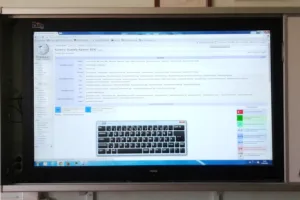“Fatih Smart Board” by The original uploader was Mustafa Alperen SEKİ at Turkish WikipediaTurkey’s Fatih Project, which aims to provide a tablet to every schoolchild in the country, is ‘on the brink of collapse’, according to local sources.
Launched in 2012, the Fatih Project has seen several delays and corruption allegations in its lifetime. A programme aired recently by Turkish TV station Kanal D cited education industry representatives, who said that the Turkish government had taken on ‘millions of dollars’ of losses due to failures in the project.
Hüseyin Tosu, from the Turkish Education Personnel Union (Türk Eğitim-Sen), told Kanal D that some schools in the pilot scheme never received the tools that they were promised. Of those schools that were sent tablets and interactive whiteboards, some did not have internet access.
737,800 of the 10.6 million tablets intended to be introduced have been distributed so far, to 52 schools, according to government data. Teachers and students have complained that the content provided on these devices is lacking, and that there are not enough charging cables to keep the tablets working. Kanal D’s coverage also claims that students in some schools are now asked not to bring the tablets to class.
Mustafa Kavlu, also from Türk Eğitim-Sen, added that Fatih has many technical problems; chief among them is that the tablets provided to students are, in many cases, not integrated with the new whiteboards or with teachers’ computers.
Display Daily Comment
It has been said to us (and reported in our IBC issue) that one of the challenges for suppliers to this project is that the specification of the tablet is continuously being revised, with vendors that want to be suppliers having to make multiple samples and prototypes for evaluation. If the installed base, even for the pilot programme, has been through the same changes, there are bound to be real challenges in making things work well enough for such a project.
This was always a visionary project, but in the end, it was always going to be about the software and systems, not the hardware. Given the economic issues in Turkey over the last year or two and the problems in the region, it would not surprise me to see it quietly dropped or “paused” for more development, only to disappear. (BR)

